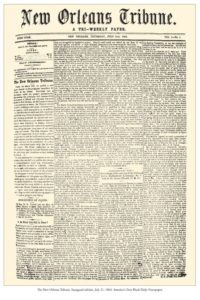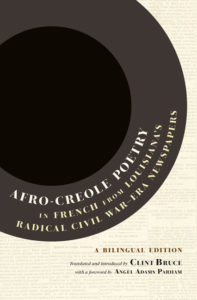Clint Bruce opens a forgotten chapter in poetry
Historian Clint Bruce just taught me to look for what I don’t know in my own backyard. I’m a native of New Orleans, educated in New Orleans schools, took a Louisiana history course in college, and never heard the story Bruce tells in Afro-Creole Poetry in French from Louisiana’s Radical Civil War-Era Newspapers: A Bilingual Edition.
On April 29, 1862, Admiral David Farragut led the Union Navy past Confederate forts on the Mississippi River and captured New Orleans, the largest and wealthiest city in the Confederacy. New Orleans would remain under Union military control for the next 15 years. Five months after Farragut’s capture of the city, a newspaper made its appearance –— L’Union. Published in French, the newspaper was unusual for one primary reason: it was owned, edited, and written by what were then known in New Orleans as gens de couleur, or people of color. Free Blacks.
According to the 1860 U.S. census, Louisiana had more than 18,000 Free Blacks, along with some 350,000 whites and almost 332,000 slaves. More than 10,000 of the Free Blacks lived in New Orleans. Their forebears had come from places like Haiti, Cuba, and other parts of the Caribbean. Many had been educated in France in the 1830s and 1840s. Collectively, they comprised a thriving, vibrant society at the time of the Civil War. But they did not enjoy the same rights and freedoms as whites.

New Orleans Tribune
That began to change with the Union occupation of New Orleans. And one of the first things to happen was the appearance of L’Union. It published news, opinion, reviews, and, common for newspapers of all kinds, poetry. L’Union lasted for about two years, until the editor ended operations after serious threats to his life. But a new newspaper almost immediately took its place, La Tribune de la Nouvelle-Orleans, or the New Orleans Tribune. Published in both French and English, it would last for the next six years, and it, too, published poetry alongside news, reviews, and opinion. Both newspapers advocated complete equal rights.
From both newspapers, Bruce selected 79 of the poems and assembled them in both their French and English versions (Bruce did the translations into English). As he notes, the poems generally follow the poetic conventions of the 19th century. Their length runs to the “long-ish,” at least as compared to contemporary poetry. What’s particularly helpful is the long (64 pages) introduction, which Bruce uses to provide the backstory of the people involved, the culture, the society, and what was happening in New Orleans.
The collection is divided into five parts: Poetry as Prophecy (generally the political poems); The War and Reconstruction; Liberty, Racial Equality, and Fraternity; the World of Ideas; and Matters of the Heart. It’s a rich diversity of subjects, from issues of racism and equality to love poems.
One of the most prolific poets for La Tribune was Adolphe Duhart (1830-1908), who published under a pseudonym. His ancestors had come from Haiti; his father was a gunsmith and Adolphe himself worked as a mason before turning his hand to acting, writing, and other literary endeavors. He was also active politically, although those actions declined after the end of Reconstruction in Louisiana in 1877. This poem by Duhart was published in the Sunday, June 24, 1866, issue of La Tribune.
A Memory

Illuminating the skies;
As soft as a prayer in flight
On a radiant angel’s sighs…
Like a memory we cherish,
As fleeting as the dawn,
It was my heart’s only wish…
But this gentle glance is gone…
As soft as the sudden surprise
Of naïve, consoling confessions;
As soft as the fragrant breeze
Perfumed by musical expressions…
Thus shall I ever recall
This sigh too soon withdrawn,
My hoping heart did hear its call,
But this sigh so sweet…is gone.
As soft as a feverish dream,
A dream of love and bliss;
As soft as a reprieve can seem
Amidst pin’s ugliness…
Thus shall I ever recall
These tears…too soon withdrawn…
My hoping heart did hear their call,
But these tender tears are gone.
(You can read an academic article on the life and work of Adolphe Duhart here.)

Clint Bruce
Bruce is a professor at the Université Sainte-Anne in Nova Scotia, where he holds the Canada Research Chair in Acadian and Transnational Studies. He also oversees the Observatoire Nord/Sud, a center for the study of the Acadian diaspora, and serves as co-editor of the journal Port Acadie. He is also a Fellow of the Center for Louisiana Studies, 2020-2025 at the University of Louisiana at Lafayette. A native of Shreveport, La., he received two bachelor’s degrees from Centenary College, a master’s degree from CUNY-Lehman College, and a Ph.D. degree from Brown University. His research focuses on the Acadian diaspora and the francophone Atlantic world, especially Louisiana.
Afro-Creole Poetry is a collection, and a work of scholarship, that opens the door of a forgotten chapter of American history and American poetry. It tells a story of a people who sought full liberty and their rights as human beings, people who yearned for a just society, and people who longed for and remembered love. Clint Bruce has done something wonderful here.
Photo by Pat Shih, Creative Commons, via Flickr. Post by Glynn Young.
How to Read a Poem uses images like the mouse, the hive, the switch (from the Billy Collins poem)—to guide readers into new ways of understanding poems. Anthology included.
“I require all our incoming poetry students—in the MFA I direct—to buy and read this book.”
—Jeanetta Calhoun Mish
- Happy Thanksgiving, from Tweetspeak Poetry (and Henry Wadsworth Longfellow) - November 27, 2025
- Finding Poetry in an Anselm Kiefer Art Exhibition - November 25, 2025
- Poets and Poems: Autumn Williams and “Clouds on the Ground” - November 20, 2025


Laura Lynn Brown says
What a great project. Impressive that he did the French-to-English translations himself.
Glynn says
L’Tribune had an English-language edition, but he translated the poems using more contemporary language. The entire project is fascinating. I’ve passed the building where both papers were published many times, and I had no idea. It’s in Conti Street in the French Quarter, about halfway between Jackson Square and Canal Street.
L.L. Barkat says
Thanks, Glynn, for reviewing this fascinating recovery of time, language, people & place. What a heritage!
Glynn says
I had an aunt who was the family historian. She traced my mother’s family back to the 1300s in southern France, until the records ran out. As a young teen, I’d spend an occasional long weekend with her at her house in the “Lower Ninth Ward,” a pre-Civil War home with two bedrooms and 12-foot ceilings. During my stays with her, she’d take me to the Louisiana State Historical Library, which then faced Jackson Square from its site in the Pontalba Apartments. We’d take the bus, about a 25-minute ride. She’d show me the books and files at the library and how she did her research. On the bus rides we’d talk mostly about her family research. But she also told me about the Free Blacks in the city; the Irish, German, and Italian immigrants who flooded New Orleans in the 19th century; and how one of our ancestors was an officer with Andrew Jackson at the Battle of New Orleans.
Sandra Heska King says
“Clint Bruce has done something wonderful here.”
You’ve done something wonderful in writing about it here.
Glynn says
Thanks for the comment, Sandra!
Sandra Fox Murphy says
I love this piece as well as your one on Jules Choppin. New Orleans is a whole different place, even before the Civil War, and I love the history pulled from the Acadian and New Orleans and Caribbean connections. Thanks for writing about these topics.